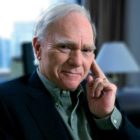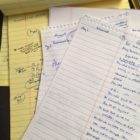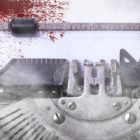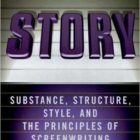 Behind the Scenes is a series of occasional posts about my efforts to write a new thriller (working title, Book 3) and about the challenges, setbacks — and perks — of returning to a writing life. Today, the first of two parts: What I Learned In 3 Days with Story Guru, Robert McKee
Behind the Scenes is a series of occasional posts about my efforts to write a new thriller (working title, Book 3) and about the challenges, setbacks — and perks — of returning to a writing life. Today, the first of two parts: What I Learned In 3 Days with Story Guru, Robert McKee
Plotting is my very favorite part of the creative process. I scribble. I doodle. I get to play God for a little while: I push the characters around, and have things happen to them, and have them do things to others. I jot down key bits of dialog. Usually, I know how it’s going to end for the main characters. I do all this with pen and paper.
Blank Screen
But there comes a time when I have to go to my desktop and keyboard to start writing chapter by chapter, pecking away letter by letter. Faced with a blank screen, I usually do what all, most, many writers do. I procrastinate. This time was no different. I rearranged the spices in my spice cabinet; I checked the expiration dates on all the condiments in the refrigerator; I made a very, very detailed schedule for writing. And, then I picked up all my notes and jottings, and wondered if I even had a good story?
“Only one way to find out,” I told my husband one day last April. “Gotta book myself into one of those three-day writers’ seminars.” I cleared my throat nervously. “It costs $865. But, you know, the guy’s brilliant.”
God of Story
 I was talking about Robert McKee, author of the bestselling book, Story: Substance, Structure, Style, and the Principles of Screenwriting, and possibly the most famous writing guru in the world. Most recently he was dubbed the “God of Story” by Vice Magazine. As it happened, he was holding a three-day seminar in New York City, a city where I had a studio at the time. So, no hotel bills. What could be better? It was three days, eleven hours a day. Worked out to about $26 an hour. A bargain when you consider that the alumni of his seminars include 60 Oscar winners, and the writers of Breaking Bad and Game of Thrones.
I was talking about Robert McKee, author of the bestselling book, Story: Substance, Structure, Style, and the Principles of Screenwriting, and possibly the most famous writing guru in the world. Most recently he was dubbed the “God of Story” by Vice Magazine. As it happened, he was holding a three-day seminar in New York City, a city where I had a studio at the time. So, no hotel bills. What could be better? It was three days, eleven hours a day. Worked out to about $26 an hour. A bargain when you consider that the alumni of his seminars include 60 Oscar winners, and the writers of Breaking Bad and Game of Thrones.
Still, I wondered if I could sit still for that long each day. And, could I stay awake?
I did — and, I did. And, I took notes until my fingers cramped.
Real Writers
I like him from the first moment he’s on stage, making his opening pronouncements:
“Real writers hate to write, and hate everything they write”
 Yesssss! That’s me. Oh boy, definitely, hate sitting down at the desktop, hate staring at the blank screen, hate tapping on that keyboard. And, oh jeez, what is that dreck I just puked up all over the page???
Yesssss! That’s me. Oh boy, definitely, hate sitting down at the desktop, hate staring at the blank screen, hate tapping on that keyboard. And, oh jeez, what is that dreck I just puked up all over the page???
His warm-up prepares the audience for three days of instruction, liberally laced with strong un-pc opinions and the f-word. Disneyworld is the “creepiest place on earth, ” he proclaims. “People who like Disneyland like Les Miz. They have no taste.” He tells us that writers “have to have taste” and a “passion for perfection. You must learn to recognize your own bad writing.”
He makes it clear almost from the beginning that this isn’t about giving us a set of rules, or a formula. Oh, except for one rule: Don’t bore people. Otherwise, it’s all about form, and the form of the story is as old as Aristotle.
Essential Elements of Story
 To paraphrase McKee: There are certain essential elements to a story — any story– whether it is told in a movie or a novel. A story is almost always a quest. An event radically upsets the balance of the protagonist’s life, (the inciting incident ). This arouses a desire in the protagonist to restore the balance. The protagonist takes actions to achieve the object of his/her desire thus provoking forces of antagonism which open up a gap between expectations and results. Nothing moves except through conflict. The protagonist faces progressive complications which build to the point where the protagonist faces the “most focussed forces of antagonism” (the crisis). At this point of greatest tension, the protagonist must take a course of action (the climax) which will determine whether the protagonist gets what she/he desires.
To paraphrase McKee: There are certain essential elements to a story — any story– whether it is told in a movie or a novel. A story is almost always a quest. An event radically upsets the balance of the protagonist’s life, (the inciting incident ). This arouses a desire in the protagonist to restore the balance. The protagonist takes actions to achieve the object of his/her desire thus provoking forces of antagonism which open up a gap between expectations and results. Nothing moves except through conflict. The protagonist faces progressive complications which build to the point where the protagonist faces the “most focussed forces of antagonism” (the crisis). At this point of greatest tension, the protagonist must take a course of action (the climax) which will determine whether the protagonist gets what she/he desires.
I suppose you could sum up the elements of story-telling in one sentence the way writer-blogger Ayodeji Awosika did in his otherwise detailed Medium article, The Ultimate Guide to Building a Writing Habit: “Somebody wants something, and someone or something is in the way of them getting it.” But, there’s a reason why Ayo is writing for free on Medium, and why Robert McKee rakes in the big bucks for a seminar that has been attended by hundreds of thousands aspiring writers all from all over the world over the last thirty years.
Plot or Character?
 Here’s something you won’t hear from most writing experts especially those who applaud writing “by the seat of your pants ” or “letting your characters take over the story” rather than plotting it out. “Plotting is not a pejorative,” says Mckee. “All stories are plotted” because plot is the writer’s choice of events.
Here’s something you won’t hear from most writing experts especially those who applaud writing “by the seat of your pants ” or “letting your characters take over the story” rather than plotting it out. “Plotting is not a pejorative,” says Mckee. “All stories are plotted” because plot is the writer’s choice of events.
He firmly squelches any debate about whether plot or character is more important to a story. “The question is nonsense,” he says. “They are two sides of the same coin BUT people fail to differentiate between characterization and true character.” He defines characterization as all those visible “traits of a character that you can know by observing and taking notes.” But characterization is not true character. You “peel away the surface of characterization by constantly putting characters under pressure progressively in order to reveal who they really are.”
“Like the male protagonist in a chick flick,” he explains. “He is bastard, he is a big bastard, he is a dirty big bastard … Actually, he’s a nice guy when you get to know him.” (Pretty Woman? 50 Shades of Grey anyone?)
As I understand McKee then: Plotting is choosing the events which progressively put the protagonist under more and more pressure arising from conflict — whether that conflict exists on an inner level, or in relationships, or with social institutions, or with the forces of the physical world. Pressure forces a protagonist to make choices, and choices made under pressure strip away characterization to reveal the true character of a protagonist.
Next: Part Two: McKee reveals the most important element in writing a GREAT story.
Disclaimer: The foregoing article touches only on aspects of the seminar which I found most helpful as a novelist, and which I have mostly paraphrased. It does not attempt to be a comprehensive review of the seminar.
Photo Credits: Bigstockphoto.com ( first and fourth from top) ;
If you liked this article, please let me know. All you have to do is click on the Like button (below or in the sidebar).
Hey Joanna,
Thanks SO MUCH for those words of encouragement. I saw a pingback of your blog post right before I sat down to write this morning. Reading what you wrote about me did wonders for my confidence.
Us writers have to stick together and encourage one another, so thanks for being so uplifting with your comparison of me and Mr. Mckee.
You’re welcome, Ayo. I’ll be posting a follow up piece about the most important element of writing a good story:Something else I learned at Robert McKee’s three-day seminar.